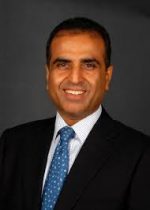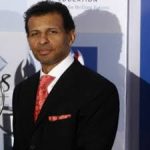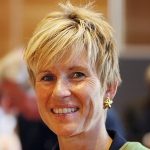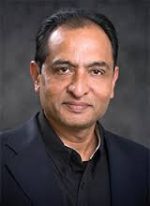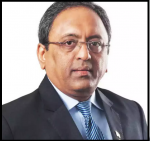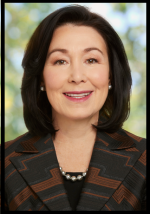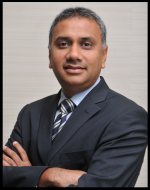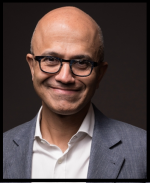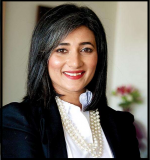Sunil Bharti Mittal (born 23 October 1957) is an Indian entrepreneur, philanthropist and the founder, chairman and Group CEO of Bharti Enterprises, which has interests in telecom, retail, financial services, and agri business. The Group flagship Bharti Airtel, with operations in 20 countries across Asia and Africa and a customer base of over 275 million, is India's largest telecom company and world's third largest mobile operator. Bharti Airtel clocked revenues of over USD 14.5 billion in FY2013. He is listed as the 8th Richest person in India by Forbes with a Net worth of $7 Billion.
In 2007, he was awarded the Padma Bhushan, India's third highest civilian honor. On 1 July 2013 he was elected Vice-Chairman of the International Chamber of Commerce Entrepreneurial ventures.
A first generation entrepreneur, Mittal started his first business in April 1976 at the age of 18, with a capital investment of ₹20,000 (US$300) borrowed from his father. His first business was to make crankshafts for local bicycle manufacturers.
In 1980, he along with his brothers Rakesh, Rajan started an Import Enterprise named Bharti Overseas Trading Company. He sold his bicycle parts and yarn factories and moved to Mumbai. In 1981, he purchased importing licences from exporting companies in Punjab.[11] He then imported thousands of Suzuki Motors's portable electric-power generators from Japan. The importing of generators was suddenly banned by the then Indian Government.
In 1984, he started assembling push-button phones in India,[11] which he earlier used to import from a Taiwan company, Kingtel, replacing the old fashioned, bulky rotary phones that were in use in the country then. Bharti Telecom Limited (BTL) was incorporated and entered into a technical tie up with Siemens AG of Germany for manufacture of electronic push button phones. By the early 1990s, Mittal was making fax machines, cordless phones and other telecom gear. Mittal says, "In 1983, the government imposed a ban on the import of gensets. I was out of business overnight. Everything I was doing came to a screeching halt. I was in trouble. The question then was: what should I do next? Then, opportunity came calling. While in Taiwan, I noticed the popularity of the push-button phone -- something which India hadn't seen then. We were still using those rotary dials with no speed dials or redials. I sensed my chance and embraced the telecom business. I started marketing telephones, answering/fax machines under the brand name Beetel and the company picked up really fast.". He named his first push-button phones as 'Mitbrau'.
In 1992, he successfully bid for one of the four mobile phone network licences auctioned in India. One of the conditions for the Delhi cellular license was that the bidder have some experience as a telecom operator. So, Mittal clinched a deal with the French telecom group Vivendi. He was one of the first Indian entrepreneurs to identify the mobile telecom business as a major growth area. His plans were finally approved by the Government in 1994 and he launched services in Delhi in 1995, when Bharti Cellular Limited (BCL) was formed to offer cellular services under the brand name AirTel. Within a few years Bharti became the first telecom company to cross the 2-million mobile subscriber mark. Bharti also brought down the STD/ISD cellular rates in India under brand name 'Indiaone'.
In May 2008, it emerged that Sunil Bharti Mittal was exploring the possibility of buying the MTN Group, a South Africa-based telecommunications company with coverage in 21 countries in Africa and the Middle East. The Financial Times reported that Bharti was considering offering US$45 billion for a 100% stake in MTN, which would be the largest overseas acquisition ever by an Indian firm. However, both sides emphasize the tentative nature of the talks, while The Economist magazine noted, "If anything, Bharti would be marrying up," as MTN has more subscribers, higher revenues and broader geographic coverage. However, the talks fell apart as MTN group tried to reverse the negotiations by making Bharti almost a subsidiary of the new company. In May 2009, Bharti Airtel again confirmed that it was in talks with MTN and the companies agreed to discuss the potential transaction exclusively by 31 July 2009. Talks eventually ended without agreement, some sources stating that this was due to opposition from the South African government.
In June 2010, Bhartil led by Mittal acquired the African business of Zain Telecom for $10.7 billion making it the largest ever acquisition by an Indian telecom firm.In 2012, Bharti tied up with Wal-Mart, the US retail giant, to start a number of retail stores across India. In 2014, Bharti planned to acquire Loop Mobile for INR 700 crores, but the deal was called off later.
Awards and recognition:
Padma Bhushan, Government of India, 2007
Transforming India Leader,NDTV Business Leader Awards
GSMA Chairman's Award
Asia Businessman of the Year, Fortune Magazine, 2006
Telecom Person of the Year, Voice & Data, 2006
CEO of the year, Frost and Sullivan Asia Pacific ICT awards, 2006
Best Asian Telecom CEO, Telecom Asia Awards, 2005
Best C.E.O, India, Institutional Investor, 2005
Business Leader Of The Year, Economic Times, 2005
Philanthropist of the Year Award, The Asian Awards, 2010
INSEAD Business Leader Award, 2011
Honoris Causa Doctorate of Sciences (D.Sc.) Degree, Amity University Gurgaon, 2016
Born : 1957
Kerala, India
Residence : Dubai
Occupation : Entrepreneur,education philanthropist
Known for : GEMS Education,Varkey Foundation
Children : Dino Varkey
Jay Varkey
Sunny Varkey (born in 1957 in Kerala, India) is a non-resident Indian, Dubai-based education entrepreneur and education philanthropist. He is the founder and chairman of the global advisory and educational management firm GEMS Education, which is the largest operator of private kindergarten-to-grade-12 schools in the world, with a network of over 130 schools in over a dozen countries. He is also the chairman of the umbrella business organisation the Varkey Group, and the founder and trustee of the philanthropic Varkey Foundation. As of 2012, Varkey is also a UNESCO Goodwill Ambassador.
Varkey Foundation:
Varkey's strong spiritual values, and the example of his father, gave him a passion for philanthropy. In December 2010, he consolidated and structured his various donations and charitable initiatives by creating the Varkey Foundation (initially the Varkey GEMS Foundation) as the philanthropic arm of GEMS. The foundation intends to impact 100 impoverished children for every child enrolled at GEMS schools, via enrolment and education-access initiatives, worldwide teacher training programs, advocacy campaigns, and physical projects such as building classrooms, schools, and learning centres. Bill Clinton launched the foundation. Argentine president Mauricio Macri met with Varkey (third from left) at the World Economic Forum in 2016.
In March 2011, the foundation partnered with UNESCO for girls' education in Lesotho and Kenya, and donated $1,000,000 to the effort. In September 2011, a further $1 million was pledged with UNESCO to train 10,000 school principals in India, Ghana, and Kenya. In 2014, the foundation's Teacher Training Programme committed to train 250,000 teachers within 10 years in under-served communities across the world.
In 2013, the Varkey Foundation helped launch the annual Global Education and Skills Forum, in partnership with UNESCO and the U.A.E. Ministry of Education. Bill Clinton gave the inaugural keynote address. Varkey hopes the annual forum will become the "Davos of education".At the second annual forum in March 2014, Varkey announced the Global Teacher Prize, a $1 million award to an exceptional teacher who has made an outstanding contribution to the profession, to be presented at the third annual GESF in 2015.
Varkey Group:
Varkey Group is the umbrella organisation covering GEMS Education and Varkey's other businesses, including healthcare and, previously, construction. Varkey founded the company in 1979, and it is based in Dubai, with additional offices in the UK, U.S., and India.
In 1984 Varkey founded Welcare, a healthcare consultancy and management venture which developed a number of hospitals and clinics. A controlling interest in Emirates Healthcare, the Varkey Group's umbrella company which held Welcare, was purchased by Mediclinic International in 2012. The sale of his healthcare sector allowed Varkey to focus on education and educational philanthropy.
Honors:
Global Indian Business Award (2007)
CEO Middle East Award – Corporate Social Responsibility (2007)
Outstanding Asian Businessman of the Year (2007)
Rajiv Gandhi Award for Eminent Educationist (2008)
Padma Shri Award (2009)
Honorary Order – Public Recognition award from the Government of Russia (2011)
Middle East Excellence CEO of the Year – Knowledge Development and Education Partnership (2012)
UNESCO Goodwill Ambassador (2012)
Education Business Leader of the Year,
Gulf Business Industry Awards (2012)
Honorary Doctorate, Heriot-Watt University
She is the majority owner of Altana, a chemical manufacturer based in Germany. She also has substantial shares in BMW. Most of her wealth has been inherited from her father.
Syed Basharat Ali, usually referred to as Syed Ali, is the founding chairman, president, and CEO of Cavium Networks, a San Jose, California-based company specializing in MIPS-based network and security processors. Cavium Networks develops and manufactures processor architectures and cores for digital consumer, networking, personal entertainment, communications and business applications.
He received a BSEE from Osmania University, in Hyderabad, India and an MSEE from the University of Michigan.
Career:
Mr. Ali worked at Samsung Electronics, SGS-Thompson, Tandem Computers, and American Microsystems Inc. (now part of ON Semiconductor) before becoming part of the founding management team at Malleable Technologies, which was acquired by PMC Sierra in 2000.
In 2000, Mr. Ali founded Cavium Networks. On May 1, 2007 Cavium had its IPO, and grew to have a market capitalization of 1.3 billion US dollars in the first week of October 2007.
Awards:
Syed B. Ali received the Ernst & Young Entrepreneur of the Year Award in 2008 and was a national finalist for the award in 2011. The Ernst & Young Entrepreneur Of The Year© award is the world’s most prestigious business award for entrepreneurs, spanning more than 140 cities and 50 countries worldwide.
Sekharipuram Narayanan Subrahmanyan was born into the world in 16th March 1960 in Chennai, Tamil Nadu. He is the Chief Executive Officer and Managing Director of Larsen and Toubro. He assumed control over the reins from Mr Anil Manibhai Naik on 1 July 2017. S N Subrahmanyan is likewise the Vice Chairman on the Boards of LTI and L&T Technology Services, Non-Executive Chairman of L&T Metro Rail (Hyderabad) Limited and Vice Chairman of the Indian global IT and rethinking organization, Mindtree procured March 2019. In February 2021, he was named Chairman of the National Safety Council (NSC) for a very long time by the Union Ministry of Labor and Employment. In this job, SNS will direct the NSC, which has a significant part to play to guarantee security in work environments under the new Occupational Safety, Health and Working Conditions Code, 2020 (OSH Code, 2020).
S N Subrahmanyan's dad, late Sri S Narayanan was a General Manager with the Indian Railways. He learned at Vidya Mandir Senior Secondary School, Mylapore in Chennai and finished his graduation in Civil Engineering from Regional Engineering College Kurukshetra (Presently National Institute of Technology, Kurukshetra or NIT Kurukshetra), Kurukshetra University in 1982. He sought after a Masters in Business Administration from Symbiosis Institute of Business Management, Pune, the University of Poona followed by an Executive Management Program from the London Business School. S N Subrahmanyan is hitched to Mrs Meena Subrahmanyan, a Postgraduate in Economics and a Gold Medalist from Stella Maris College, Madras University. The couple have two children, Sujay and Suraj. He likewise has a distinct fascination for Western Classical music and cricket.
S N Subrahmanyan joined the ECC Division of Larsen and Toubro in 1984 and started working with pioneers like Cheyur Ramaswamy Ramakrishnan (previous Joint Managing Director, L&T), A Ramakrishna (previous President and Deputy Managing Director, L&T) and K V Rangaswami (previous President, ECC). In July 2011, S N Subrahmanyan was selected as full-time Director on the L&T Board and assigned as Member of the Board and Senior Executive Vice President (Construction). In October 2015, he was assigned Deputy Managing Director and President, L&T. In 2017, he was elevated to the part of Chief Executive Officer and Managing Director of Larsen and Toubro (L&T) by the organization's directorate. He was Ranked 36th in the '2014 Construction Week Power 100. He was Featured in the Top 50 Utilities Leaders In The GCC 2021.
Safra A. Catz was born in 1st December, 1961 in Holon, Israel, is an Israeli-American extremely rich person financier and innovation leader. She is the CEO of Oracle Corporation. In September 2014, Oracle declared that Ellison would venture down as CEO and that Mark Hurd and Catz had been named as joint CEOs. She has been a chief at Oracle since April 1999, and a board part since 2001. In April 2011, she was named co-president and (CFO), reporting to organizer Larry Ellison.
Catz is married to Gal Tirosh and they have two children. Her dad was an immigrant from Romania. She moved from Israel to Brookline, Massachusetts at six years old. Catz moved on from Brookline High School. She procured a four year college education from the Wharton School of the University of Pennsylvania in 1983 and a J.D. from the University Of Pennsylvania Law School in 1986.
Catz was an investor at Donaldson, Lufkin and Jenrette, filling in as an overseeing chief from February 1997 to March 1999 and a senior VP from January 1994 to February 1997 and recently held various investment banking position since 1986.
Salil Parekh is the current CEO and overseeing director of Infosys. Parekh took over from interval CEO U B Pravin Rao on 2 January 2018. He is an alum from the Indian Institute of Technology, Bombay (IIT Bombay) in Aeronautical Engineering and holds a Master of Engineering certificate in Computer Science and Mechanical Engineering from Cornell University.
Parekh was individual member of the group from the gathering the management board at Capgemini, where he had worked since 2000, after Ernst and Young's consultancy division, where he had been working previously, was converged into the organization.
Most recently, he was individual from the gathering chief executive board, and was selected agent CEO in March 2015. He was answerable for directing a business group including Application Services and Cloud Infrastructure Services among others.
One Board individual from Infosys got two unknown informant grievances of untrustworthy practices at Infosys that additionally denounced Salil Parekh. Review Committee of the Board of Directors led autonomous examination concerning the claims contained in the unknown informant objections and verified that the charges are significantly without merit. The Audit Committee led an intensive examination with the help of free legitimate guidance Shardul Amarchand Mangaldas and Co. also, PricewaterhouseCoopers Private Ltd.
Samar Singh is an Indian Bhojpuri singer as well as dancer, film editor, composer. Samar Singh is one the finest Bhojpuri male singer who created history through his melodious voice. He is in the top list of Bhojpuri male singers. Nowadays, he is most popular Singer of Bhojpuri Film industry and all his songs get hit. Samar Singh was born on 12 June 1989 in Azamgarh, Uttar Pradesh India. Samar Singh, age is 31 years old, according to the year of 2020.
Samar Singh Bhojpuri singer completed his education from the Gram Samaj Inter College of Azamgarh, Uttar Pradesh and he got his higher level education from VBS Purvanchal Jaunpur, Uttar Pradesh India. His Village name is Azamgarh. Samar Singh caste is Hindu. Samar Singh started his carrier in Bhojpuri Song as Bhojpuri Singer and does Live Stage Show.
Samar Singh got more popularity in the Bhojpuri film industry through 'Saiya Dharawela Thresar' Bhojpuri song. This song crossed 142 M+ View’s on YouTube. Saiya Dharawela Thresar Bhojpuri song was sung by Kavita Yadav and Samar Singh. Music of this Bhojpuri gana is composed by ADR Anand and lyrics written by Alok Yadav. After this, he has sung many blockbuster hits Bhojpuri gana video. Samar Singh most viewed Bhojpuri gana video was made under the label of Jupiter Entertainment.
One of the super hit song of Samar Singh is ‘Upar Ke 32 Niche Ke 36’ from the ‘Ganna Ke Ras’ Bhojpuri Album Song. Samar Singh Bhojpuri song video ‘Upar ke 32 niche ke 36’ breaks the records of Bhojpuri film industry and crossed 72 M+ Views on YouTube. It was made and produced under the label of wave music. After getting more popular in Bhojpuri industry, Samar Singh gives one by one Bhojpuri hit song and he never looks back. He also achieved fame and glory in film line.
Samar Singh will be also seen in his Bhojpuri Film ‘Vinashak’ Starring Bhojpuri hot actress ‘Anjana Singh’. Ayaz Khan and Sanjay Pandey will be seen in supporting role Bhojpuri singer Samar Singh. Vinashak Bhojpuri movie is directed by Mithai Lal D Yadav and Produced by Shweta singh along with Samar Singh.
By Samar Singh fan Parth Pawar
Satya Narayana Nadella was born in 19 August 1967 in Hyderabad of present-day Telangana, into a Telugu-speaking Hindu family. India is an Indian-born American business chief. He is the chief administrator and CEO of Microsoft, succeeding Steve Ballmer in 2014 as CEO and John W. Thompson in 2021 as administrator. Prior to turning out to be CEO, he was the chief VP of Microsoft's cloud and enterprise group, liable for building and running the organization's computering platforms. Nadella went to the Hyderabad Public School, Begumpet prior to getting a backbenchers in electrical engineering from the Manipal Institute of Technology in Karnataka in 1988. Nadella then, travel to the U.S. to study for a M.S. in software engineering at the University of Wisconsin–Milwaukee, accepting his degree in 1990. Afterward, he got a MBA from the University Of Chicago Booth School Of Business in 1996. Nadella said, "I generally realized I needed to build things.
His mom Prabhavati was a Sanskrit teacher and his dad, Bukkapuram Nadella Yugandhar, was an Indian Administrative Service officer of the 1962 group in 1992, Nadella wedded Anupama, the girl of his dad's IAS batch mate. She was his junior at Manipal seeking after a B.Arch in the Faculty of Architecture. The couple have three youngsters, two little girls, and one boy, and live in Clyde Hill and Bellevue, Washington. His child Zain is a legally visually blind quadriplegi with cerebral palsy. Nadella and his wife Anupama are part of ownership group of Seattle Sounders FC, a Major League Soccer club. Nadella is an energetic reader of American and Indian poetry. He likewise nurses an passion for cricket, having played in his school group Nadella has wrote a book named Hit Refresh that explore his life, his profession in Microsoft and how he accepts innovation will shape what's to come. He declared that the benefits from the book would go to Microsoft Philanthropies and through that to non-profit organizations.
Nadella working at Sun Microsystems as an individual from its innovation staff prior to joining Microsoft in 1992. Nadella filled in as the senior VP of Research and Development (R&D) for the Online Services Division and VP of the Microsoft Business Division. Afterward, he was made the leader of Microsoft's $19 billion Server and Tools Business and drove a change of the organization's business and innovation culture from customer administrations to cloud infrastructure and services. He has been credited for helping bringing Microsoft's database, Windows Server and engineer tools to its Azure cloud. In 2018, he was a Time 100 honouree. In 2019, Nadella was named Financial Times Person of the Year and Fortune magazine Businessperson of the Year. In 2020, Nadella was recognized as Global Indian Business Icon at CNBC-TV18's India Business Leader Awards in Mumbai.
Schauna Chauhan is the CEO of Parle Agro and the eldest little girl of its originator, Prakash Chauhan. She deals with the Finance, HR, Legal, Manufacturing and Operations of her organization. Under her aegis, Parle Agro has extended from being just a drink major to one of the top heads of food and refreshment industry, fabricating notable items, like Frooti, Bailey, Hippo and LMN.
Schauna finished her tutoring from Kodaikanal International School. She went to Switzerland to complete her Bachelor's certificate in International Management from Franklin College in Lugano. She then, at that point read for two additional years from the Business School in Lausanne. Afterward, she went to the UCLA and went through two months prior to getting back to join her dad's organization in India. In school and school, Schauna was a major devotee of sports and effectively participated in numerous games with her companions and sisters. She adored playing hockey, football, volleyball, baseball, tennis and badminton. She was additionally the chief of the hockey group. Her #1 spot was Amateurs Rider's Club, where she used to ride at 6 o'clock each day. She was likewise a team promoter during her educational time.
Schauna is the little girl of Meera and Prakash Chauhan, originator of Parle Agro. Her sisters are Alisha and Nadia. She is hitched to the Bollywood entertainer Bikram Saluja and has a child named Jahaan. She is extremely attached to her Bull mastiff breed canine, Brando. Schauna began working with the Parle Agro at 1999, functioning as a chief at 22 years old. She turned into its CEO in 2006 and from that point forward, the gathering expanded into different regions and positively influenced the worldwide market. The scope of Parle Agro ventured into heated bites, dessert shop and unadulterated organic product juices, trading items to more than 50 nations. At first, the organization sold Thumps Up and began the (PET) plastic business, from that point forward, has been ceaselessly developing and adding new brand expansions, including Saint Apple Juice and Hippo Round-Round.
